Chef Jason Bangerter’s unselfish generosity
is well known in a selfish and indulgent industry where egos run high and boyish swagger and tattoos predominate. We first encountered Chef Bangerter’s generosity and talent when he helmed Auberge du Pommier‘s very French kitchen. He later created imaginative menus for Oliver & Bonacini’s then newly opened TIFF-oriented Luma where Chef generously developed menus for Fife House’s annual Taste for Life event and as well as casual, creative food for the street level O & B Canteen. And he is a very popular guy these days. Between traveling to Paris to pick up the ‘Relais & Châteaux Rising Chef 2015′ award, giving interviews to several media outlets, being listed on La Liste, France’s answer to The Worlds 50 Best Restaurants, and recently awarded the Ontario Hostelry Institute‘s 2017 Gold Award in the Chef category, he regularly visits other Relais & Châteaux properties to digest what is being created in those kitchens. Even with a hectic schedule and growing celebrity, he has not lost his genuine sense of humanness and wonder at the possibilities of food. We wander the back fields and still-green November gardens of Langdon Hall, plucking, tasting and smelling the bits and bites of wild edible greens and leftover carrots, beets and brussels sprouts that have not been scavenged and gobbled up by the local Blair rabbits. “There is always a good amount of marigold, geranium, mature rosemary trees, laurel, lemongrass, and figs and even wood sorrel and chickweed that hide in the greenhouse. But even the weeds are tasty”, Chef enthuses. We spend a leisurely hour chatting sustainability, family, growing up in the back fields of Milton, Ontario and his continued love of pulling on a chef’s jacket and firing up a six burner and creating passionate food for the many guests of Langdon Hall.
How did it feel to be chosen one of the ‘Relais & Châteaux Rising Chef for 2015′?
Well. Pretty amazing. It was a real honour to receive this recognition. My team and I have worked very hard, and it is nice to have it recognized internationally within such a prestigious organization. I felt excited and very honoured to be presented this award. The entire food and beverage team at Langdon Hall work very hard every day to excel at what we do. I believe the team today is the best I have had since arriving. This award is a tribute to their hard work and dedication to our goals. I am very proud of what we have achieved. And we are only getting started.
You are now three years in since assuming the kitchen at Langdon Hall from an established chef who elevated the hotel’s restaurant to success and recognition that not many Canadian establishments have experienced. How was your transition into what was, essentially, someone else’s kitchen? How quickly were you able to ‘make your mark’?
I was given the wheel to drive on day one! Obviously, any impact is immediate when a new set of eyes hit the floor. It did take some time to settle in, understand systems, process, and expectations. Langdon Hall has a lot of moving parts in many areas of the property. Even after doing TIFF, it was a lot to take in and manage mentally at the start. It isn’t like moving from one kitchen to another. This kitchen has a forest filled with wild edibles to learn about. A massive garden in which the chef dictates growth and works closely with the head gardener to develop crops and then incorporate them into menu and guest experiences. It took almost two years to develop and train a good team and in the time I have been at LH, my team is the strongest it has ever been. That is very exciting and I look forward to what we can achieve in the coming years.
What is one of your earliest food-related memories?
There are many memories I have that revolve around food. Chasing lobsters on the kitchen floor at my grandparents’ home in Nova Scotia. Watching my Grandpa and Dad clean pickerel at the cottage on Lake Panache. Sitting on a giant slab of raw granite lakeside, eating just-picked warm wild blueberries with milk for breakfast with my little brother and Grandma. My interest in cooking started in my early childhood and my passion for food was found in my heritage, my roots. As a child, holidays were shared between grandparents in Parry Sound, Ontario, hunting, fishing, foraging wild berries and ramps, cottage life cooking, and in Amherst, Nova Scotia on the ocean digging clams, visiting the lobster boats and baking bread (which my Grandpa, at 95, still does). Food was always a topic of conversation and always a highlight of family gatherings. My Auntie Jan is the gourmand in the family. And around age 5, I remember smelling baked escargot and hearing the pop of champagne while enjoying her culinary creations and teachings.
Tell me about an average day?
(Chef chuckles) No day is average at Langdon Hall. It changes every day, every week. The Bakery kicks off at 4 am. Breakfast is rocking at 7. And of course, it entirely depends on what’s going on at LH. Typically I wake up around 7 am. I start the day with my two boys Sebastian and Christian. We have breakfast together and get them ready for school. I drop them off and then work out for an hour before heading to work. I arrive at Langdon Hall around 10:30 am. Visit all the stations and check in with the sous chefs. I am there for lunch service. Menu planning and meetings are in the afternoon and then on the pass and in the dining room at dinner. It’s quite fluid, which is unpredictable and exciting at the same time. There is never a dull moment at Langdon Hall.
How would you describe your style of cooking? Truffles seem to be a passion. What is a typical Jason Bangerter dish?
My training has strong European roots; French cuisine has always been the greatest influence in my career. However, as my career develops so does my style and philosophy. I have embraced the farm-to-table movement over the years and focused on sustainability as well as foraging. I have been fortunate to expand and fully explore this style at Langdon Hall, which offers a 75-acre estate for foraging wild edibles, a chefs kitchen garden, honey, maple harvesting and wonderful local farm ingredients. It is inspired by the seasons, wild produce growing in abundance on the property and the bounty of our kitchen gardens.
Relationships are built with local farmers, foragers, and artisans who hold similar beliefs providing wholesome natural products that are prepared with care and respect. My cuisine has changed since arriving at Langdon Hall. The property is full of incredible culinary treats. Mushrooms, berries, leeks, ginger, maple trees, watercress and much more. There is an estate vegetable garden overlooked by head gardener Mario Muitz. It boasts some of the best vegetables I have had the chance to work with. There are some of the most passionate farmers and artisans in the area delivering only the best. This is where my inspirations come from. My dishes start with the property’s delights and the community’s offerings.

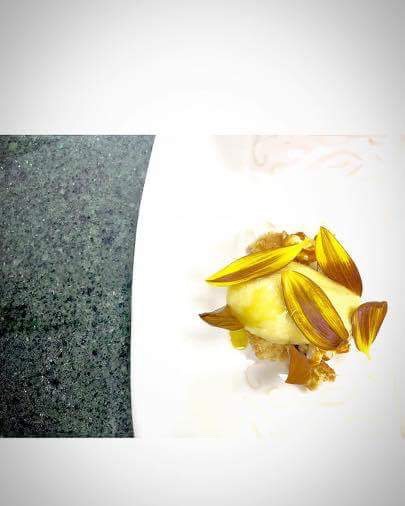
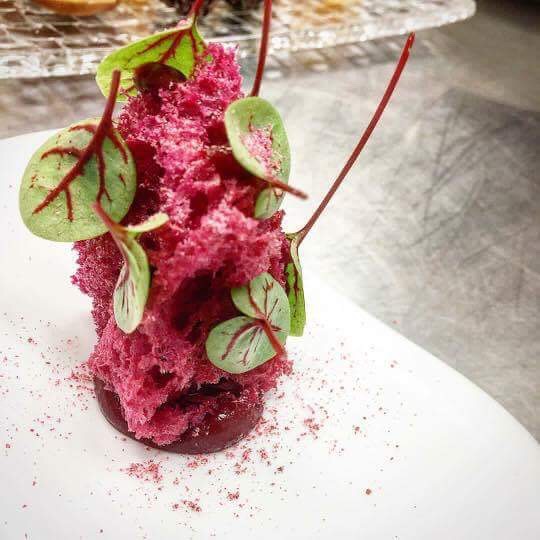
What does food mean to you?
Food means life. It means joy. Family, conviviality, strength and nourishment. Food is powerful. It tells a story. Food is awesome. It is a forum for creativity and mystery. It is a way to communicate and educate.
You have mentioned the ability to forage and that local sustainability is an integral part of your kitchen’s big plan. Tell me about that. Do you consider yourself a ‘Wild Food’ expert?
The kitchen’s big plan is to make tasty food! Not just to eat, to have an experience one that will not be forgotten. One that makes sense for the setting. Delivers a sense of place. I am conscious of the effects on the environment that my menu choices make. I am an advocate of preserving fish species and working towards responsible fishing practices to ensure healthy reproductive rivers, oceans, and lakes. I have learned a lot about gardening and wild foods, harvesting, and preserving. I wouldn’t call myself an expert. I know a lot more now though then when I was a chef in the city.
You seem to enjoy simply walking out Langdon Hall’s back door and having a wealth of ingredients from Southwestern Ontario at your fingertips. How are you incorporating say, Pine, Chick Weed or Oxeye Daisy into your dishes?
They are the stars of the show! What makes dining at Langdon Hall a unique experience. Pine is used for powders, crumbles, flavouring oils, butter, or for curing and smoking. Oxeye daisy buds for pickles, petals for delicate floral flavours and the leaves for a fresh juicy punch of lettuce. And this is the thing. Coming to Langdon Hall has been an incredible experience. I have been given the opportunity to re-invent myself as a chef and strengthen my cuisine philosophy. I have learned a lot about wild indigenous edible plants and the life cycle of growth in the garden. I have been fortunate to make relationships with farmers and artisanal producers in this area, and I have had a whole wealth of new ingredients introduced to me. I’ve been able to create dishes with new flavors and textures.
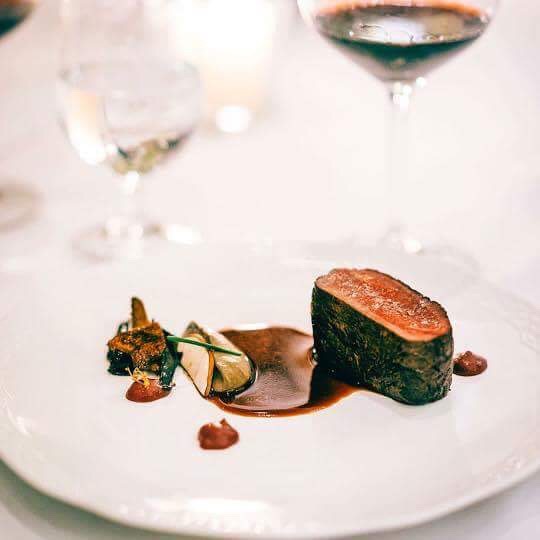

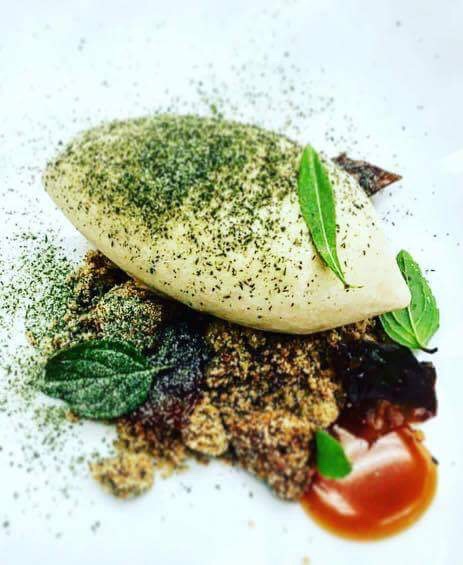
What do you do when you’re not cooking?
Cook of course! I have two young boys at home, 8 and 11. Crazy athletes and lots of fun. I also enjoy spending time with my hottie, nonstop, Triathlon/Crossfit wife and our three year old husky. We spend a lot of time in the forest or on trails in the Niagara Escarpment. My days at home can be just as crazy as at work. I like to work out. I like to eat out. I like to drink wine. We spend time with family. I try to golf. I ski, and since becoming the chef at Langdon Hall, I enjoy a little gardening at home. I spend time with my family. Hockey, lacrosse, soccer, football, music. The boys are busy! I try to sneak out with my wife for a date once and a while too. I am always studying, watching the food industry, writing menus, sourcing new and exciting products.
What’s the one food you absolutely cannot stand?
I love all food. Or at least all the food I have tasted. I have had less than perfect experiences with Okra. But I don’t hate it.
Who do you draw inspiration from in the industry?
I can honestly say that every individual I have worked with through all the kitchens I have stepped foot in, has had some impact on me and influenced my development as a chef. I am inspired by many chefs from many types of cuisine from across the globe. The ones that I have worked with directly and have helped me develop into the chef I am today are John Higgins, Anton Mosimann, and Michael Bonacini. My work ethic, drive, views on this career has been developed by each person I have worked with in every kitchen I have stepped into around the world. Obviously, there are specific individuals that I draw from, but there are many that have influenced me and inspire me to be what I am in the kitchen today. My team inspires me every day. As a young cook coming up through the ranks, these are some of the chefs that were an inspiration: Daniel Boulud, Marco Pierre White, Alain Ducasse, Olivier Roellinger, Raymond Blanc, Thomas Keller, Charlie Trotter and Patrick O’Connell.
Any advice for those who want to make cooking a profession?
Push on. Put your head down and go when it’s go-time. Listen, learn and retain when its learn-time. It is really quite simple. You become as great or not as great as you allow yourself. It is all depending on you. Push yourself. Find a great mentor. Respect them and then learn all you can learn from them. It is a wonderful profession! BUT, it takes hard work and dedication to be at the top.
It won’t come easy. Know you love it. You have to want to be successful.
Finally, what does the future hold, food-wise for Langdon Hall?
More delicious dishes. Happy guests and an overall heightened experience, I hope! I will continue to develop wonderfully inspired dishes using the harvest of the property and gardens. We will continue to strengthen relationships with farmers and producers in the area supporting them and reaping the rewards of their hard work and passion.
More great things to come.

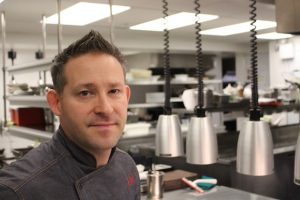
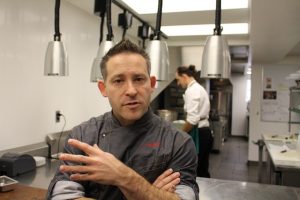
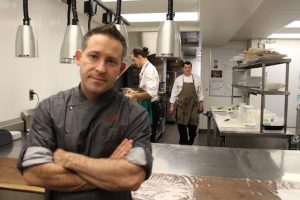
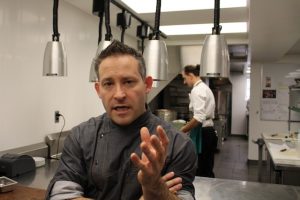
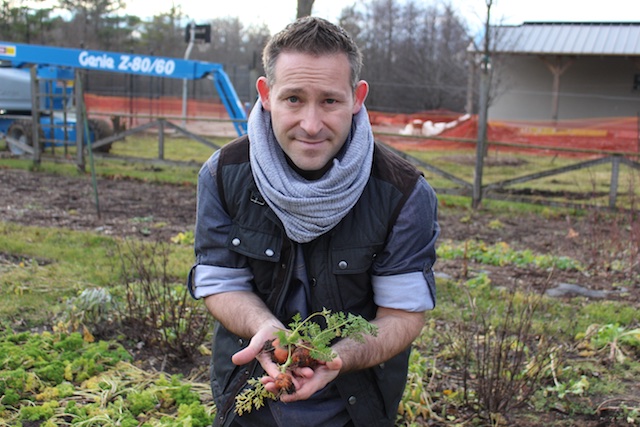







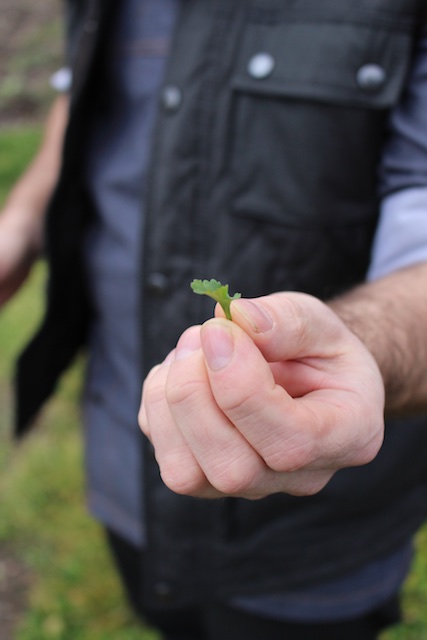
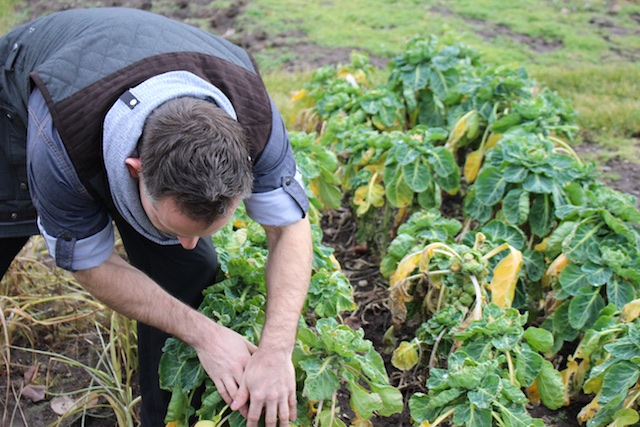

Comments